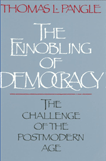• Home | • Curriculum Vitae: » PDF | • Return to Books & DVD


The Ennobling of Democracy:
The Challenge of the Postmodern Age
The Challenge of the Postmodern Age
The Johns Hopkins University Press, 1992
With the end of the Cold War, says Thomas L. Pangle, liberal democracy was deprived of its traditional enemy and forced to reexamine its internal structure and fundamenta aims. One result has been the moral relativism of many mainstream Western intellectuals. In a spirited response to "postmodern" doubts and confusion, Pangle returns to classical political philosophy and the Enlightenment tradition to rediscover--and defend--the enduring ideas at the heart of American democracy.
The Ennobling of Democracy offers a searching critique of postmodernism and its implications for political life and thought....
The Ennobling of Democracy offers a searching critique of postmodernism and its implications for political life and thought....
Thomas Pangle cogently points to one of the central paradoxes of contemporary life. Even as liberal democracy has emerged as the aspiration for countless peoples in disparate cultures around the world, its theoretical foundations have come under sustained attack from postmodernists in the countries of its birth, the United States and France. The Ennobling of Democracy begins its urgent task of deconstructing deconstructionism, and in the process greatly enriches our understanding of the threats to contemporary democracy.
-Francis Fukuyama
When a thinker of Thomas Pangle's learning, moral seriousness, and prudence sounds an alarm at the 'civic irresponsibility,' 'spiritual deadliness,' and 'philosophical dogmatism' of our currently dominant modes of thinking, we need to begin worrying. when he outlines an agenda for reinvigorating our republican experiment, we would do well to pay heed.
-Mary Ann Glendon, Harvard University
Full of learning and wisdom, The Ennobling of Democracy makes a powerful case for a modern use of the dialectical method of Socrates applied to the great books of the Wwestern tradition as a necessary foundation for our liberal democracy. It presents a challenge that serious thinkers about democracy and education should not evade.
-Donald Kagan, Yale University
Pangle has written a deeply thoughtful book about the theory of republican regimes, which in their modern form have come to be known as democracies. The supreme virtue of the book is its seriousness.... The book begins with a discussion of the attack on modern Enlightenment philosophy that has come to be known as postmodernism, an attack also aimed at dismantling the claims of the older Socratic rationality. Pangle's purpose in this book is partly to defend the claims of modern theorists of republicanism that they have created if not a full science of free government, at least something worthy of respect. Even more importantly, he wishes to show how Socratic rationality (as it finds its expression in philosophy, particularly the dialectic questioning and answering that rises to the most fundamental questions) is necessary to a diagnosis of the shortcomings of contemporary republican regimes.
-American Political Science Review
A truly serious criticism of modern society would grasp the best arguments in favor of it. Here is where Pangle is in his element, and this is why he might arguably be called the best critic of modern political and social thought. In Part III of this book and in two previous books on Montesquieu and Locke, he provides a brilliantly clear introduction to the intellectual prophets of modern society. These are the thinkers who guided the leading founders of the united States, and whose sometimes errant followers govern the modern world.... Pangle does not simply call for classical moderation. He exemplifies it by considering both pros and cons of his own views and by respectfully tracking lines of thought he disagrees with. Reading Pangle is a challenge if you just take for granted the basic ideas of modern democracy, personal freedom, religious pluralism, and either classical or welfare liberalism. But the challenge is worth it.
-The Detroit News
There is much to admire, appreciate, and learn from in Pangle's morally serious, erudite, and illuminating account.... Pangle also provides an eloquent reminder of what might be called the democratic role of studying the classic texts in political theory, understood as they should be as guides to the great questions rather than as catechisms in a canon. I have my quarrels with the Straussians, but any student will learn more from studying the ancients with a teacher like Pangle than with someone whose idea of critical analysis is the self-congratulatory revelation that Homer was a sexist.... Pangle wants to synthesize the modern republican concern for consent with the classical republican concern for wisdom. Pangle is also on target with his contention that the health of the democratic project in the twenty-first century will depend in significant measure on whether it can avoid the spiritual deracination that Nietzsche foresaw without lapsing into the irrationalist and authoritarian reaction that Nietzsche prefigured.
-Political Theory
In The Ennobling of Democracy, Thomas L. Pangle designates the latest ramification of the death of God as "the postmodern predicament." Pangle sees it as the principal challenge to the liberal West in the aftermath of the cold war and the collapse of global communism.... Pangle has done us the great service of enjoining a debate that cannot be avoided. He has done it with his usual intellectual rigor and moral seriousness.
-Perspectives on Political Science
A reasoned book that is yet full of pathos, quite 'conservative' according to the narrow current typologies, but capable of instilling an authentic desire for spiritual independence.
-Filosofia Politica
Polish translation by Marek Klimowicz: Uszlachetnianie demokracji: Wyzwanie epoki postmodernistycznej (Krakow: Wydawnictwo Znak, Library of Political Thought of the Center for Political Thought, 1994).

